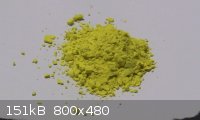
Chemistry Alchemist - 25-7-2012 at 23:26
A long time ago i got some pigment paint and separated the insoluble pigment from the actual paint, Now i look back at it and say to my self... what
is this? I remember looking over some wiki and somewhere i came across Barium Chromate or Strontium Chromate, both are yellow but im still unsure on
how to test it... i don't have overly that much and i dont want to waist it all doing tests when i want to make a youtube video about it if i know
what it is, is there some way to test what it actually is?

Im able to do very small scale if you have any idea's to what it is.
Teen Chemist - 26-7-2012 at 04:13
How about you try a flame test green for Barium red for Strontium.
Chemistry Alchemist - 26-7-2012 at 05:34
Will that work with chromates?
Teen Chemist - 26-7-2012 at 05:41
Not sure but its worth a try seeing as it only needs a very small amount.
mineralman - 26-7-2012 at 07:26
Could also be zinc. I believe a flame test will work. I found this page and it shows what looks like a flame test in progress.
http://isearch.avg.com/images?s=sideNav&cid=%7b7F407966-...
http://isearch.avg.com/images?q=STRONTium+Chromate&sap=d...
http://www.indiamart.com/vapi-oxide-colour/anti-corrosive-pi... MM
TheChemINC - 19-8-2012 at 19:28
in some paints they use cadmium salts for yellow color...
Yo-Yo - 19-8-2012 at 21:52
I think it is iron ochre. Fe2O3. It is a common non-toxic yellow, red or black pigment.
woelen - 19-8-2012 at 22:44
Add a pinch of it to hydrochloric acid and carefully sniff (!!). If it is CdS, then you will notice the smell of rotten eggs and the pigment dissolves
to a colorless solution.
Certain chromates also can be detected this way. E.g. zinc chromate or barium chromate give a yellow/orange solution in hydrochloric acid, but PbCrO4
does not (or only very slightly so), because of the immensely low solubility of PbCrO4.
Yo-Yo - 19-8-2012 at 23:22
I think it is iron ochre. Fe2O3. It is a common non-toxic yellow, red or black pigment.
SM2 - 20-8-2012 at 05:37
like woelen said, the basic tests are called for 1st. ESPECIALLY when, at the time this paint was made, it had to be inorganic, not withstanding. I
mean, it would probably be inorganic at any time it was made unless it was picric acid, or some horribly toxic hybrid. but that there does conger up
juicy stuff like picric or a nitro styrene.
Do what Yoyo suggests, and use some iron out or KMNO4 or some hydrosulphide - see if you get the sort of reduction you are looking for.
